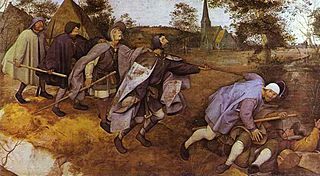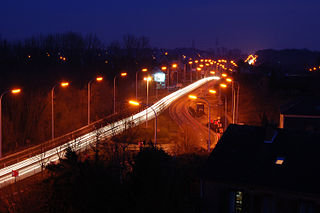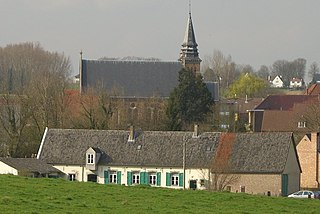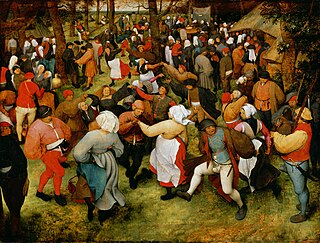
Pieter Brueghelthe Younger was a Flemish painter known for numerous copies after his father Pieter Bruegel the Elder's work, as well as original compositions and Bruegelian pastiches. The large output of his studio, which produced for the local and export market, contributed to the international spread of his father's imagery.

Pieter Bruegelthe Elder was among the most significant artists of Dutch and Flemish Renaissance painting, a painter and printmaker, known for his landscapes and peasant scenes ; he was a pioneer in presenting both types of subject as large paintings.

Dilbeek is a municipality in the province of Flemish Brabant, in the Flemish region of Belgium. The municipality comprises the villages of Dilbeek proper, Groot-Bijgaarden, Itterbeek, Schepdaal, Sint-Martens-Bodegem, and Sint-Ulriks-Kapelle. Dilbeek is located just outside the Brussels-Capital Region, in the Pajottenland, hence the local name Poort van het Pajottenland. Even though Dilbeek is located in the Dutch language area of Belgium, there is a French-speaking minority represented by 3 members on the 35-seat local council. It is a mostly residential community with some preserved rural areas and some industrial zones.

Sint-Pieters-Leeuw is a municipality in the province of Flemish Brabant, in the Flemish region of Belgium.
The Pajottenland is a distinct region within the Flemish Brabant province and the south-western part of the Brussels Region of Belgium. The region is located west-southwest of Brussels. The Pajottenland is predominantly farmland, with occasional gently rolling hills, and lies mostly between the rivers Dender and Zenne / Senne. The area has historically provided food and drink for the citizens of Brussels, especially Lambic beers, which are only produced here and in the Zenne valley where Brussels is.

David Vinckboons was a Dutch Golden Age painter born in Mechelen, Southern Netherlands. Vinckboons, whose name is often spelled as Vingboons, Vinghboons, Vinckebonis or Vinckboom, had at least ten children. His sons were the cartographer and watercolourist Johannes and the architects Justus and Philip. Vinckboons himself died in Amsterdam.

The Blind Leading the Blind, Blind, or The Parable of the Blind is a painting by the Netherlandish Renaissance artist Pieter Bruegel the Elder, completed in 1568. Executed in distemper on linen canvas, it measures 86 cm × 154 cm. It depicts the Biblical parable of the blind leading the blind from the Gospel of Matthew 15:14, and is in the collection of the Museo di Capodimonte in Naples, Italy.

Sint-Martens-Bodegem is a historic village that is now part of Dilbeek. It has 2638 inhabitants.
Sint-Ulriks-Kapelle is a village and deelgemeente of Dilbeek, Belgium.

The Wine of Saint Martin's Day is the largest painting by Pieter Bruegel the Elder. It is currently held in the Museo del Prado, Madrid, where it was identified as a Bruegel original in 2010. Like much of Bruegel's work it depicts peasant life, in this case a festival known as St. Martin's Day, which involves drinking the first wine of the season.

Groot-Bijgaarden is a village and deelgemeente in the municipality of Dilbeek, a suburb of Brussels, in Flanders, Belgium.

Peeter Baltens, Pieter Balten or Pieter Custodis, was a Flemish Renaissance painter, draughtsman, engraver and publisher. Baltens was also active as an art dealer and poet. He was known for his genre paintings, religious compositions and landscapes.

Itterbeek is a historical village in the province of Flemish Brabant, Belgium, and since 1977 a submunicipality of Dilbeek.

Schepdaal is a village and deelgemeente of Dilbeek in Flanders, Belgium.

Sint-Gertrudis-Pede is a village in Dilbeek.

The watermill at Sint-Gertrudis-Pede (Pedemolen) in the municipality of Dilbeek is the only working watermill in the Pajottenland, and is protected as a monument since 1975

De Viron Castle is a castle in Dilbeek, Flemish Brabant, Belgium. It has served as the town hall of Dilbeek and offices of the municipality since 1923 and was listed as a protected monument in 1990.

St. Anna's Church is a Roman Catholic church in Sint-Anna-Pede, in the municipality of Dilbeek, Belgium, built around 1250. It is depicted in the painting The Blind Leading the Blind by Pieter Breughel the Elder.

The Wedding Dance is a 1566 oil-on-panel painting by Pieter Bruegel the Elder. Owned by the museum of the Detroit Institute of Arts in Detroit, Michigan, the work was discovered by its director in England in 1930, and brought to Detroit. It is believed to be one of a set of three Bruegel works from around the same time: The Wedding Dance, The Peasant Wedding (1567) and The Peasant Dance (1569).

Several oil-on-oak-panel versions of The Massacre of the Innocents were painted by 16th-century Netherlandish painters Pieter Bruegel the Elder and his son Pieter Brueghel the Younger. The work translates the Biblical account of the Massacre of the Innocents into a winter scene in the Netherlands in the prelude to the Dutch Revolt against Spanish rule, also known as the Eighty Years' War.


















